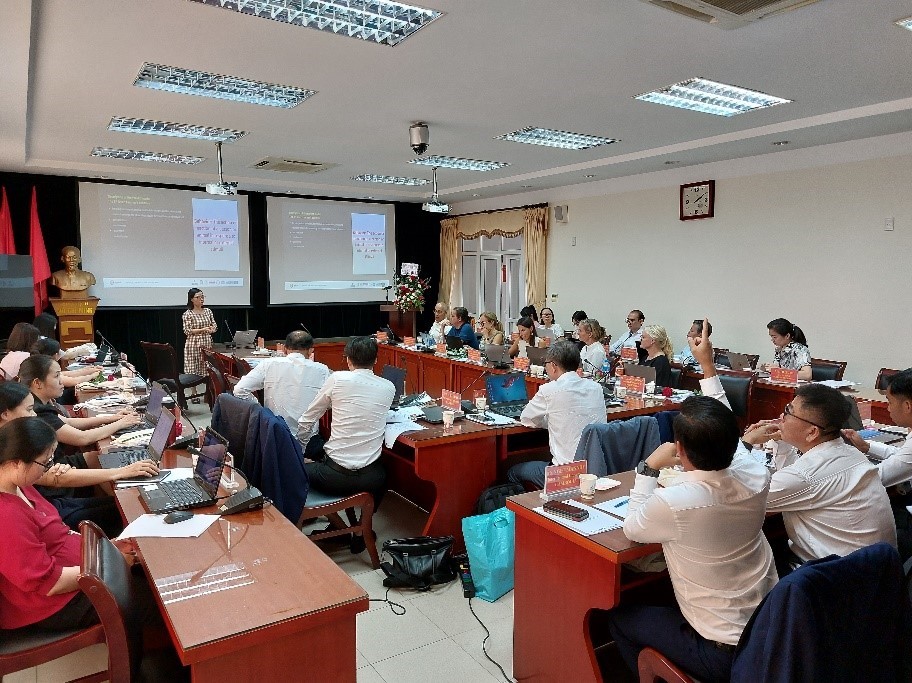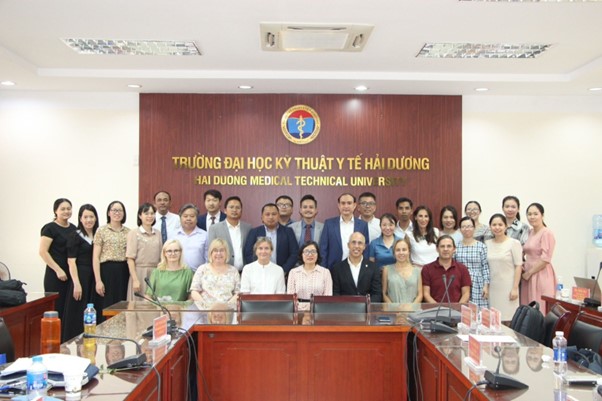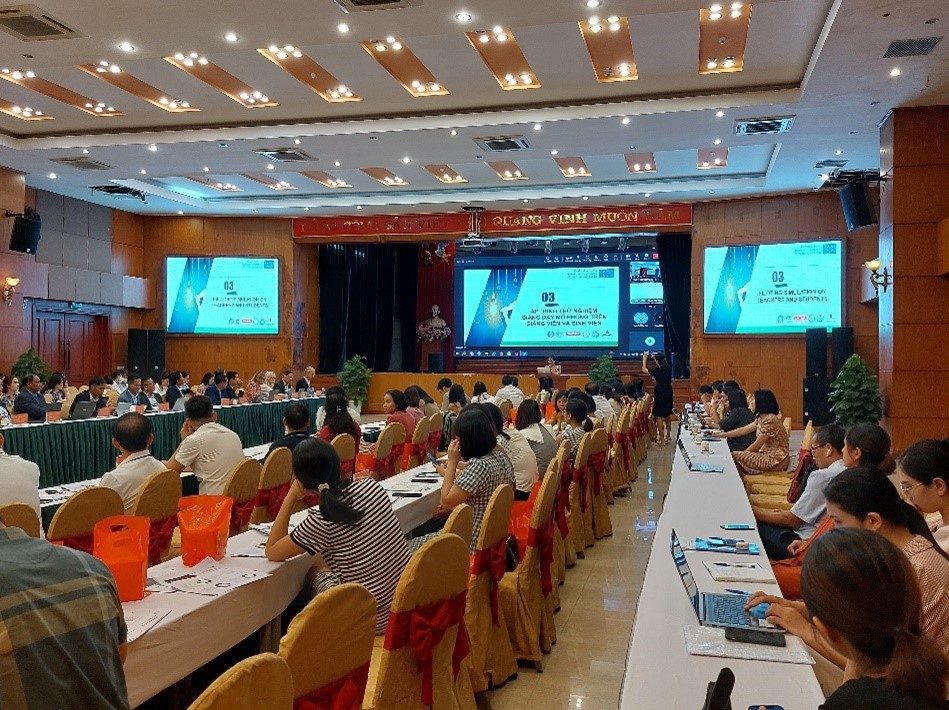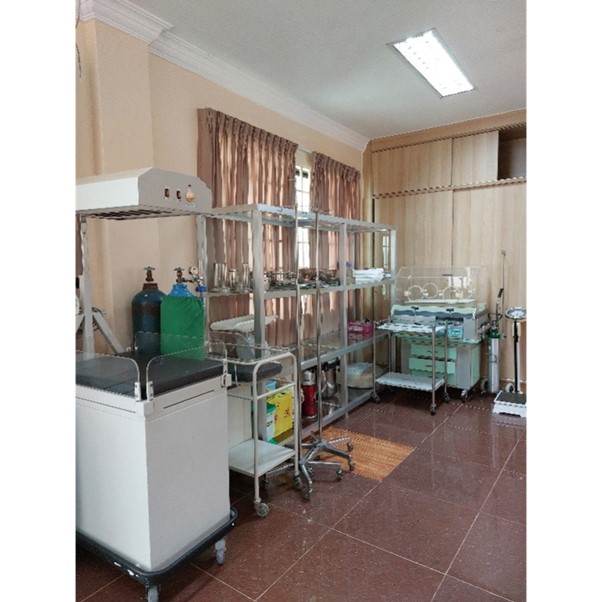
Savonia Article: The efficacy of the PrevInf-project’s Transnational meetings is achieving the project goals
The collaboration in an international project of higher education institutions (HEI) requires cultural knowledge, academic excellence, and online skills (Wahan et al. 2023), but also face-to-face meetings.
Transnational project meetings are essential for fostering cross-cultural collaboration, involving extensive discussions, group work, and the finalization of key project materials. This article delves into the efficacy of these transnational gatherings, shedding light on how they contribute to achieving the overarching objectives of the PrevInf project.
Transnational meetings support the actions to achieve the PrevInf-project goals
The Erasmus+ Capacity Building project, ‘Capacitating Asia’s Nursing Students on Innovative and Sustainable Prevention and Control of Healthcare-Associated Infections (PrevInf)’, aims to promote infection prevention and control (IPC) teaching in Asian countries. The partner universities are from Vietnam (Hai Duong Medical Technical University and Nam Dinh University) and Cambodia (International University and Bolyno Institute). The goal is to make health care students and future professionals more competent and active developers in healthcare-associated infection prevention and control (HAI-PC).
The PrevInf-project transnational meetings have been held in all partner countries, the latest in Vietnam (August 2023) and Cambodia (November 2023). The goals of these last international meetings were to finalize project disseminations. Additionally, the aim was to gather information on the integration of project products and methods into the healthcare education of all partner universities’ curricula.

Picture 1. The PrevInf-partners are ready for the transnational meeting in HMTU, Vietnam.
Face-to-face meetings, as opposed to online meetings, have provided an opportunity for exchange of ideas, which is crucial for the progress and achievement of international projects. Work included finalizing the educational materials for teaching and learning (E-books), scientific articles, project presentation videos and websites. At the end of the project, the E-books will be available online for free, in English, Khmer and Vietnamese. The transnational meetings have provided a platform to discuss the results of the piloting of IPC teaching methods and materials produced in the project with partners. One major action was to support the partner countries in integrating the project’s methods, e.g., simulation pedagogy into their curricula (Silén-Lipponen et al. 2022).
To process of writing scientific articles
Publishing scientific articles is a significant dissemination of the PrevInf-project and has required discussion and guidance throughout the process. Each Asian partner universities have been responsible for one scientific article. Savonia and Coimbra teams have provided support in the article writing especially in methodology, results analysis and scientific writing. The partners have been committed to maintaining a precise schedule so that articles progress smoothly alongside other tasks. In this project, successful scientific writing has gained a lot also from the face-to-face discussion with the authors from partner countries in the transnational meetings. Regarding the obstacles, the partners have been committed to writing high-quality scientific articles, and their expertise and competence in this type of work has increased. The articles have progressed, with one already accepted for submission, two submitted for publication and the finalization of the last article is processed collaboratively.

Picture 2. The discussion of writing scientific articles.
International conference to support the implementation of HAIs-PC into health care curriculum
Each partner university has held an international conference and participated in partner universities’ events presenting the project’s results. The transnational meeting in Vietnam, organized by HMTU, culminated in an international conference. The other three international conferences were held online in November 2023, with a huge success. The overall number of participants at all international conferences was over 1000.
Participants attended from local universities and hospitals, from the Nurses Association, the Ministry of Health, and other influential health decision-makers. Participants were enthusiastic about new opportunities to develop IPC education and enhance overall patient safety. They emphasized the importance of evidence-based project products in both infection control content and pedagogy. Overall, there was interest in the project’s products, and it was a pleasure to announce that all materials are freely available on the project’s website. The international conferences enabled project partners to meet with local leaders and discuss possibilities for the permanent integration of project results into their curriculum and teaching practices. For example, Hai Duong is enthusiastic about simulation pedagogy and has learned to internalize the method through long-term collaboration, tutor-like guidance, and positive feedback. The project has also inspired them to use simulations for studying and teaching other key topics.

Picture 3. International event in Hai Duong Medical Technical University, Vietnam.
Familiarizing oneself with the health care education in partner universities
The possibility to familiarize oneself with the healthcare education in all partner universities is unique. All universities have a wealth of interdisciplinary healthcare expertise. During the visits, it has been possible to get acquainted with and network with actors in biomedical laboratory science, physiotherapy and medical education as well. Partner universities are interested in developing healthcare curricula and spreading reforms nationwide. Even after the conclusion of the PrevInf-project, Savonia would have opportunities to collaborate in development with universities since we have successfully built a trusting and appreciative partnership with them. The challenges of attracting and retaining nursing and other healthcare students are like those in Europe, so the goals could be shared.

Picture 4. The skill lab room in the International University, Cambodia.
Summary
Collaboration strengthened among all partners during the transnational meetings. Continuing possible collaboration in the future is natural because we have established a trusting relationship and an open culture of discussion. We have successfully developed and supported Asian countries in simulation pedagogy, and in the future, we could also help them address challenges in further developing the method related to infection control prevention and control or more broadly to other topics (Sreymom Oy et al. 2023).
The PrevInf-project’s last transnational meeting will be in February 2024 in Coimbra, Portugal. The aim of the meeting is to support the sustainability plan of the project, and to address the implementation and outputs of the project for the final report.
Savonia UAS PrevInf –project members:
Leena Koponen, Senior Lecturer, MSc, RN, Savonia University of Applied Sciences, Department of Health care, leena.koponen@savonia.fi
Marja Silén-Lipponen, Principal Lecturer, PhD, Savonia University of Applied Sciences, Department of Health care, marja.silen-lipponen@savonia.fi
Ulla Korhonen, Senior Lecturer, MSc, BLS, Savonia University of Applied Sciences, Department of Health care, ulla.korhonen@savonia.fi
Mikko Myllymäki, Development Manager, Savonia University of Applied Sciences, Department of Continuous Learning, mikko.myllymaki@savonia.fi
References:
Silén-Lipponen Marja, Koponen Leena, Korhonen Ulla & Myllymäki Mikko. (2022). Using a Massive Open Online Course (MOOC) to promote infection prevention and control learning in healthcare education. International Journal of Infection Control 18. https://doi.org/10.3396/ijic.v18.21667
Sreymom Oy, Chan Hang Saing, Mengieng Ung, Marina Zahari, Inthavong Nouhak, Sothea Kim, Michiko Nagashima-Hayashi, Dyna Khuon, Virya Koy, Sovatha Mam, Somphou Sayasone Vonthanak & Saphonnand Siyan Yi. (2023). Developing an infection prevention and control intervention to reduce hospital-acquired infections in Cambodia and Lao People’s Democratic Republic: the HAI-PC study protocol. Frontiers in Public Health 11, 1239228. https://doi.org/10.3389/fpubh.2023.1239228
The Erasmus+ Capacity Building project, ‘Capacitating Asia’s Nursing Students on Innovative and Sustainable Prevention and Control of Healthcare-Associated Infections (PrevInf). https://previnf.com/
Waham Jihad Jaafar, Asfahani Asfahani & Ulfa Risa Alfiyah. (2023). The Global Trends in Higher Education: A Comparative Analysis of Enrollment and Quality Assurance Mechanisms. International Journal of Educational Reasearch 1(1), 23-29. https://edujavare.com/index.php/EDUJAVARE